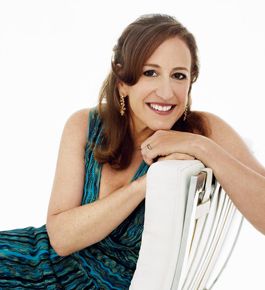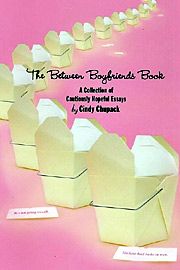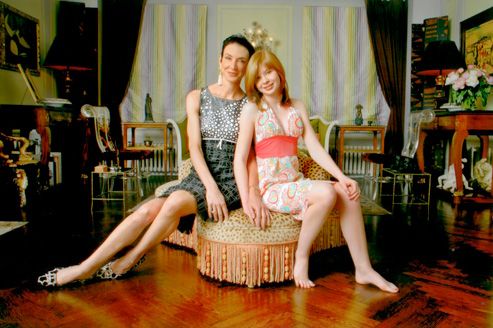LAM: But you did find true love again…
CC: It’s funny because by the time the show ended, most of us had sort of settled down, gotten married or fallen in love. What Carrie realized at the end of the show, when she left her computer at home to go to Paris, is that you just want to live life. And for me, it did hit a point where I think I felt that I was just coaching life as a writer instead of looking for love. It was fun to be able to write and I feel like there were so many stories that so many writers wrote that had a ring of authenticity.
LAM: The city of New York was really like a character, along with the women and the men in the show. With you being a single woman in New York, you must have seen so many different types of men who gravitate to cities like New York and Los Angeles. You must have felt like a kid in a candy store for material.
CC: New York was so big you could always meet new people and there was hope that you can go around the corner and meet someone new. Wherever you live inNew York you make a little neighborhood out of it, with your own dry cleaner and grocery store. It’s almost like a small town because you actually know all these people and see them going into the same stores every day.
LAM: Dating in L.A. had to be confusing, compared to dating in New York.
CC: Los Angeles is confusing to me because it’s a real industry town and I was often confused if I was on a business dinner or on a date. I think that makes it a little confusing since business relationships there are always crossing the line. I remember at one point I wanted to meet a guy who didn’t want me for my mind. I thinkL.A. is a harder place to be single, because in New York there is so much more interaction. I remember I was in L.A. at a Christmas party and it was all couples with matching sweaters and babies. I basically started to hyperventilate and had to go outside, and I remember the next week when I went to New York I finally felt as though I could exhale. It felt easier to be single in New York. In L.A., sometimes, however, by being the new kid in town you have to act like a tourist and that can be an advantage, too.
L: What about men in L.A.?
C: I have to say I like New York men more. I think there is something gritty about New York and, as they say, if you can make it there you can make it anywhere. That applies to dating as well. I think L.A. is a tricky place because there are a lot of failed marriages and there is a lot of trading in your old wife for a younger model and alot focuses on appearances. Nothing ever feels stable. I mean, if Elizabeth Hurley gets cheated on, how good do you have to look? That’s how it feels inL.A. I think Los Angeles is an easier place to be in a couple, and a good place to raise kids if you can keep morals in check, but I like being single better in New York. And I liked importing my husband from New York to L.A.
LAM: Let’s talk about New York style and how that applied to your series.
CC: When I started on Sex And The City, even though I went to school at Northwestern in Chicago, I was still a small town girl from Oklahoma. I showed up in New York knowing nothing about fashion. I was still wearing clothes from Express and The Limited. Sarah Jessica said that this would be an interesting transition to watch, because when you are in New York you can’t help but to find your own style. I remember the first time I wrote that Carrie reached into her Kate Spade bag and Pat Field, the costume designer, came in saying Carrie wouldn’t be carrying a Kate Spade purse. I just wrote the only name I could think of. It took a long time to learn all of that.
LAM: Tell me about how you and your team seemed to create a pivotal question that you would answer throughout the episode? How did you come up with episodes’ questions… was that based on real life? Did you find that it was an effective narrative element for you, sort of writing that way?
CC: Yes, I thought it was a fantastic device, but I can’t take credit for it because I only came into the series on the second season and it was done since the first season. It was a great organizing principle for an episode and a great way to remind myself when I was writing an episode that it was about four women and we weren’t always trying to find an answer to the question, but really exploring it. And we would always try to think of questions that the viewer really might want to explore.
LAM: You came up with some great questions that were, as you say, explored.
CC: For me there were so many questions. I wrote the one for Carrie that was called ‘Is hope a drug we need to go off of?’ or is it keeping us alive? I wrote it because I remember feeling what you hope a relationship would truly be… or is it making you ignore what the relationship actually is? With relationships, I was thinking only about potential and not about the reality of it. And, wouldn’t it better to be cynical and pleasantly surprised, instead of being hopeful and hurt? Another good example is one summer I was coming back to the show and all these woman were asking me, ‘Are these girls sluts? They seem to sleep around with so many men.’ So I came back and wanted to make an episode about it, and I called it ‘Are we sluts?’
LAM: Right. And you touch upon that a little in your Between Boyfriends Book that has also been widely successful. You cover a range of topics in relationships. Both women and men love it.
CC: I seem to have a good audience for it between ladies and gay men. It seems dating is similar; it’s about dating men, which both know well. It kind of takes you from break up to next boyfriend and every stage in between. In it I wrote individual essays and it’s really about commiserating and laughing about how difficult it can be. I’m just kind of trying to help you laugh along about them. And to feel better about them and about how everyone can make those mistakes. It’s part of all the things that one goes through. I’m really proud of it and it was fun to compile.
LAM: And you contributed a chapter in the new Girls Who Love Boys Who Love Boys book, about straight women who fall for gay men…
CC: Being on Sex And The City I was surrounded by many, amazing gay men, and I have always had wonderful gay friends, and reluctantly married someone who realized he was gay, which is in the book. Darren Star, Michael Patrick King, John Malphy, who all wrote and produced on the show, are all gay. As were so many of our production designers and people involved with the production. I feel like I got all of my good taste from them. I am not stereotyping, but gay men have great taste.
LAM: Congratulations on that book, too. And it seems like you have found your happily ever after…do you have any advice for the single people looking to get married?
CC: I think there is a lot of truth to what we were trying to say with the show, which is that you have to be happy with yourself before you can find a relationship and find someone who can complement you. To me that means you have to learn to be the loudest expression of yourself.
I was recently talking to a friend and said ‘It’s almost like Marco Polo dating.’ If you are very quietly saying ‘Marco’ and staying in the same little pool, the chances of finding someone are not so good. You’ve got to be loud, but you have to be a loud expression of yourself, so do the work you love and the activities you love. Reading books you love. The more you surround yourself with the things you love and figuring out the things you love, the better shot you have at finding the right complement to that. And finding someone that will support that life and hopefully someone that has that for themselves. Then your lives won’t get smaller together, they will be bigger.



